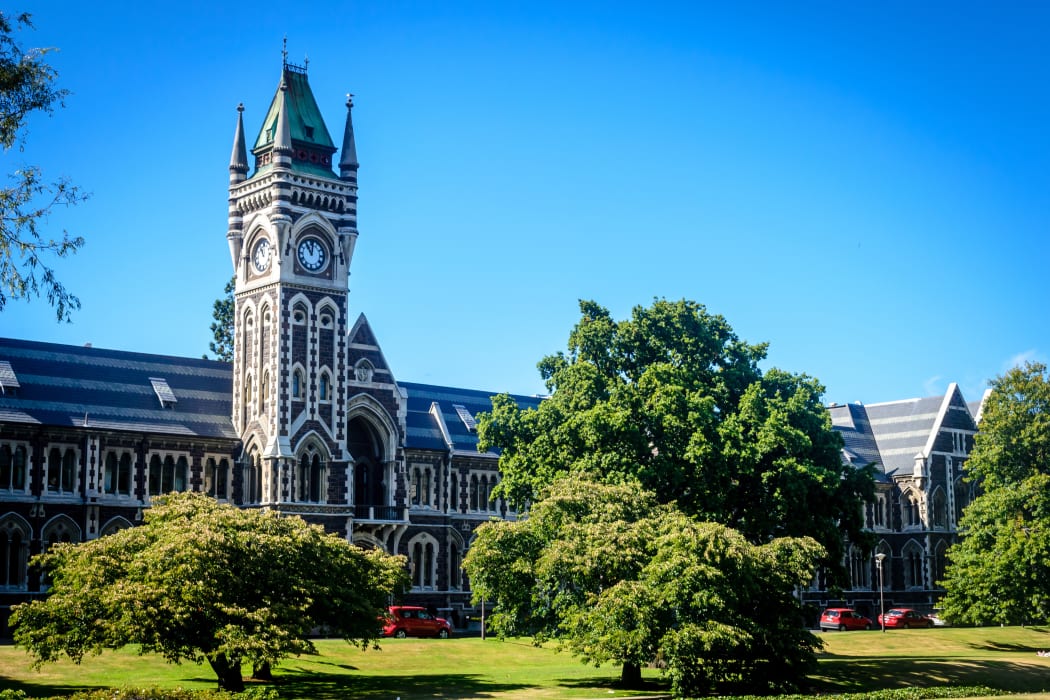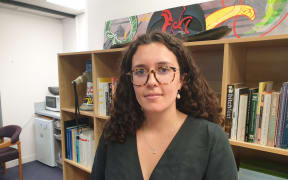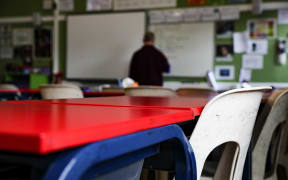The government has ruled out international students returning in July and August in time for the next semester but will be announcing a recovery plan next month for the $5 billion industry.

The clocktower building at the University of Otago. Photo: 123rf
Ali Khan, a doctoral student at the University of Otago, has been stuck in the United States since early this year.
He said he would have made other plans if the government had made it clear much earlier students wouldn't be allowed back for next semester.

Ali Khan. Photo: Supplied
"There hasn't been any advice from the university or the government and how they're handling PhD students, doctoral candidates and researchers. Because our stuff is time-sensitive and it requires ethics and guidelines, and peer reviews and networks with our supervisors - it's not something we can sit online and do."
Khan, who was researching the Human Rights Act and its influence on long-term employment, said he would miss an important opportunity to collect data for his research if he could only come back next year - and the data he had already collected would be outdated.
He called for the government to treat PhD students and doctoral candidates as essential workers because without research and publication, New Zealand was going to "lose its strategic position in a very competitive market."
"PhDs are creating new knowledge, epistemology, and solving for issues that are wide-ranging from medical operations, supply chain management, policies, laws, regulations, international business, hospital administration, financial sector, labour market performance, and so on," he said.
"The ramifications long-term for the schools are that their rankings will go down, their enrolments will go down, their research production will go down and they will lose a lot of credibility."
Student saying ban will damage reputation
Johnnie Wang, a student at the University of Auckland, was angry when he saw an email from the minister of education, Chris Hipkins, to the university, ruling out a return of foreign students for the start of next semester.
The email said "international students will not be returning to New Zealand in July or August this year. We hope that a suitable model can be developed so we can start to bring in small cohorts of students and begin building up towards 2021".
Wang, who was also a student representative on the university council, said: "There is no reason why we believe that international students from other countries like China and the UK will be more likely to carry the virus than a Kiwi from China or the UK," he said.

Photo: Supplied
Wang said apart from the loss in revenue, the ban will damage the country's academic future and reputation, and it was not only unfair to those who could not come back but also unfair to students who were here.
"Our university is forced, actually by the government, to consider how to survive and how to help students who are trapped off-shore. Originally we could focus on providing higher quality education and to more students."
There are 9000 people overseas with valid New Zealand study visas.
Universities have plans
Universities New Zealand director Chris Whelan said his organisation - which represented eight universities - recognised it was going to take time to develop a credible plan to bring back students.

Chris Whelan. Photo: SUPPLIED
"We hope those plans don't take too long. There's a lot of pressure and need from both students and New Zealand community itself. It's a $5b-a-year industry. It creates tens of thousands of jobs in this country. So getting it restarted is import for New Zealand but getting it restarted safely is also important."
Whelan told Morning Report "We are also not surprised. The failures over the last couple of weeks are showing taking a little bit longer to get it right is important...
"We have plans in place [to accommodate thousands of students if they came back] but we fully understand that our assurance is not enough. It's got to be the government that's defining what are the standards and monitoring and assuring that those standards are actually met.
"We are working with government on that."
He said universities had some strong quarantine plans in place.
"We're actually able to do things like make staying in quarantine a requirement of your visa. If you breach quarantine you will be deported and we have stand-alone facilities where we can look after these students."
He said universities had respect for the mood of the nation and only wanted to restart when they could do so safely.
The national president of the Students' Association, Isabella Lenihan-Ikin, said there was another big problem that also needed to be fixed.
"We need to make sure that international students who are still in New Zealand are supported. There are a lot of different ways that international students have been saying that they can be supported. One way is to refund the international students that have paid for tens of thousands of dollars for studies they were not able to access," she said.
Hipkins said in a statement that the plan the government was releasing next month would outline how it intended to help the sector recover.
"We know that the international education sector has been significantly impacted by the border closure and many providers and students are suffering. The government and the education sector are working closely together so the international education sector emerges stronger and more resilient from this challenging time," he said.
"I will be sharing a four-year strategic recovery plan for international education next month. The plan will stabilise and strengthen the system to ensure that it's mutually good for students, providers, and benefits New Zealand economically and socially."
Covid-19 response leads to increase in applications
Auckland University of Technology vice chancellor Derek McCormack told Morning Report all universities were seeing increases in applications, over 50 percent more than last year and more than that in some cases.
"There is a demand to come to New Zealand and that will be due to a number of factors, and one of them will be our success in dealing with Covid here," McCormack said.
Preventing international students from returning would cause "big implications for the universities financially, [and] big implications for students that are part way through their studies... and for the economy
"We are looking at the possibility of a $50 million revenue hole if no students can come back ... in 2021," McCormack said.
Universities needed to know by August whether a return next year was going to be allowed, he said.
And getting support of the public was a big issue.
"We want it to be a safe entry, we want to ensure that we don't put the nation's health in jeopardy. "
He said, however, that there was a strong economic case for the students to return.
There were a range of measures that could be taken to police quarantined students at universities.
Some included online education, good staffing and security to ensure the quarantine was sound.







